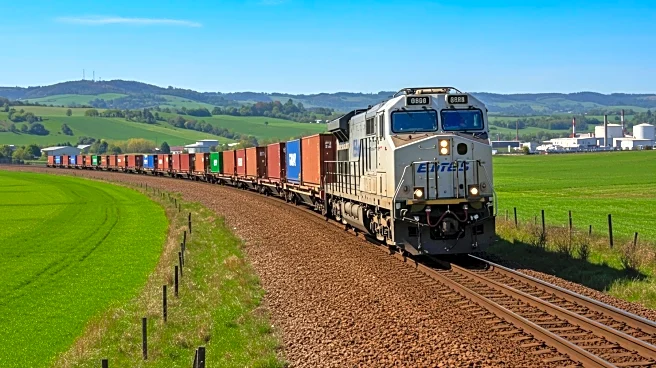What's Happening?
Norfolk Southern Corporation, a major player in rail transportation, is enhancing its services to include a wide range of agriculture and consumer products. The company transports various goods such as soybeans, wheat, corn, fertilizers, livestock feed, food products, and beverages. Additionally, it handles chemicals, metals, construction materials, and automotive products. Norfolk Southern's stock recently traded at $280.05, reflecting a positive movement in the market. The company has a market capitalization of $62.90 billion and a P/E ratio of 18.92. Its financial health is supported by a debt-to-equity ratio of 1.11, a current ratio of 0.79, and a quick ratio of 0.71.
Why It's Important?
Norfolk Southern's expansion in transporting agriculture and consumer products is significant for the U.S. economy, as it supports the supply chain for essential goods. This move can enhance efficiency in the distribution of raw materials and finished goods, potentially lowering costs for producers and consumers. The company's robust financial metrics indicate stability and potential for growth, which could attract investors looking for reliable stocks in the transportation sector. As the demand for efficient logistics solutions grows, Norfolk Southern's strategic positioning may offer competitive advantages in the market.
What's Next?
Norfolk Southern may continue to expand its transportation services, potentially exploring new markets or increasing capacity for existing ones. Stakeholders, including investors and industry partners, will likely monitor the company's performance and strategic decisions closely. Future developments could include partnerships with agricultural producers or consumer goods companies to further streamline logistics and distribution processes.
Beyond the Headlines
The expansion of Norfolk Southern's services could have broader implications for environmental sustainability, as rail transportation is generally more energy-efficient compared to road transport. This shift might contribute to reduced carbon emissions in the logistics sector. Additionally, the company's focus on diverse product categories may lead to innovations in rail transport technology, enhancing service reliability and efficiency.








